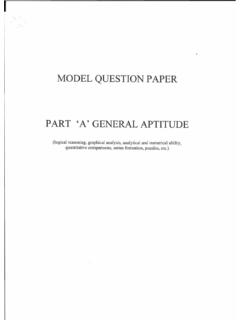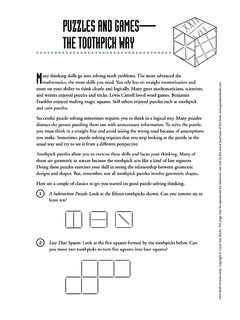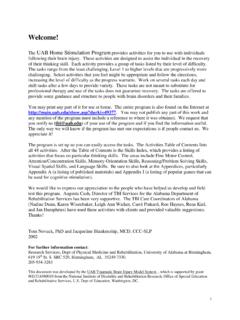Transcription of Logic Puzzle Ever1 S - Steven Landsburg | The Big ...
1 The Hardest Logic Puzzle Ever1 By George Boolos S OME YEARS AGO, THE LOGICIAN AND Puzzle -MASTER Raymond Smullyan devised a logical Puzzle that has no challengers I know of for the title of Hardest Logical Puzzle Ever. 1'11 set out the Puzzle here, give the solution, and then brietly discuss one of its more interesting aspects. The Puzzle : Three gods A, R, and C are called, in some order, True, False, and Random. True always speaks truly, False always speaks falsely, but whether Random speaks truly or falsely is a completely random matter. Your task is to determine the identities of A, R, and C by asking three yes-no questions; each question must be put to exactly one god.
2 The gods understand English, but will answer all questions in their own language, in which the words for "yes" and "no" are "dam and "ja," in some order. You do not know which word means which2 Before I present the somewhat lengthy solution, let me give answers to certain questions about the Puzzle that occasionally arise: It could be that some god gets asked more than one question (and hence that some god is not asked any question at all). What the second question is, and to which god it is put, may depend on the answer to the first question. (And of course similarly for the om speaks truly or not should be thought of as depending on the flip of a coin hidden in his brain: if the coin comes down heads, he speaks truly; if tails, falsely.)
3 Random will answer da or ja when asked any The Solution: Before solving The Hardest Logic Puzzle Ever, we will set out and solve three related, but much easier, puzzles . We shall then combine the ideas of their solu- tions to solve the Hardest Puzzle . The last two puzzles are of a type that may be quite familiar to the reader, but the first one is not well known (in fact the author made it up while thinking about the Hardest Puzzle ). Puzzle 1: Noting their locations, I place two aces and a jack face down on a table, in a row; you do not see which card is placed where. Your problem is to point to one of the three cards and then ask me a single yes-no question, from the answer to which you can, with certainty, identify one of the three cards as an ace.
4 If you have pointed to one of the aces, I will answer your question truthfully. However, if you have pointed to the jack, I will answer your question yes or no, completely at random. Puzzle 2: Suppose that, somehow, you have learned that you are speaking not to Random but to True or False - you don't know which - and that whichever god you're talking to has condescended to answer you in English. For some rea- son, you need to know whether Dushanbe is in Kirghizia or not. What one yes-no question can you ask the god from the answer to which you can determine whether or not Dushanbe is in Kirghizia? Puzzle 3: You are now quite definitely talking to True, but he refuses to answer you in English and will only say da or ja.
5 What one yes-no question can you ask True to determine whether or not Dushanbe is in Kirghizia? H ERE'S ONE SOLUTION TO Puzzle 1: POINT TO THE middle card and ask, "Is the left card an ace?" If I answer yes, choose the left card; if I answer no, choose the right card. Whether the middle card is an ace or not, you are certain to find an ace by choosing the left card if you hear me say yes and choosing the right card if you hear no. The reason is that if the middle card is an ace, my answer is truthful, and so the left card is an ace if I say yes, and the right card is an ace if I say no. Rut if the middle card is the Jack, then both of the other cards are aces, and so again the left card is an ace if I say yes (so is the right card but that is now irrelevant), and the right card is an ace if I say no (as is the left card, again irrelevantly).
6 To solve puzzles 2 and 3, we shall use iff Logicians have introduced the usehl abbreviation "iff," short for "if, and only if." The way "iff works in Logic is this: when you insert "iff' between two state- ments that are either both true or both false, you get a statement that is true; but if you insert it between one true and one false statment, you get a false statement. Thus, for example, "The moon is made of Gorgonzola iff Rome is in Russia" is true, because "The moon is made of Gorgonzola" and "Rome is in Russia" are both false. But, "The moon is made of Gorgonzola iff Rome is in Italy" and "The moon lacks air iff Rome is in Russia" are false.
7 However, "The moon lacks air iff Rome is in Italy" is true. ("Iff has nothing to do with causes, explanations, or laws of nature.) To solve Puzzle 2, ask the god not the simple question, "Is Dushanbe in Kirghizia?" but the more complex question, "Are you True iff Dushanbe is in Kirghizia?" Then (in the absence of any geographical information) there are four possibilities: 1) The god is True and D. is in K: then you get the answer yes. 2) The god is True and D. is not in K.: this time you get no. 3) The god is False and D. is in K.: you get the answer yes, because only one statement is true, so the correct answer is no, and the god, who is False, falsely says yes.
8 4) The god is False and D. is not in K.: in this final case you get the answer no, because both statements are false, the correct answer is yes, and the god False falsely says no. So you get a yes answer to that complex question if D. is in K. and a no answer if it is not, no matter to which of True and False you are speaking. By noting the answer to the complex question, you can find out whether D. is in K. or not. The point to notice is that if you ask either True or False, "Are you True iff X?" and receive your answer in English, then you get the answer yes if X is true and no if X is false, regardless of which of the two you are speaking to.
9 The solution to Puzzle 3 is quite similar: Ask True not, "Is Dushanbe in Kirghizia?" but, "Does da mean yes iff D. is in " There are again four possibili- ties: 1) Da means yes and D. is in K.: then True says da. 2) Da means yes and D. is not in K.: then True says ja (meaning no). 3) Da means no and D. is in K.: then True says da (meaning no). 4) Da means no and D. is not in K.: then both statements are false, the statement "Da means yes iff D. is in K." is true, the correct answer (in English) to our question is yes, and therefore True says ja. Thus you get the answer da if D. is in K. and the answer ja if not, regardless of which of da and ja means yes and which means no.
10 The point this time is that if you ask True, "Does da mean yes iff Y?" then you get the answer da if Y is true and you get the answer ja if Y is false, regardless of which means which. Combining the two points, we see that if you ask one of True and False (who we again suppose only answer da and ja), the very complex question, "Does da mean yes iff, you are True iff X?" then you willget the answer da ifX is true andget the answer ja ifX is false, regardless of whether you are addressing the god True or the god False, and regardless of the meanings of da and ja. We can now solve The Hardest Logic Puzzle Ever. Your first move is to find a god who you can be certain is not Random, and hence is either True or False.






